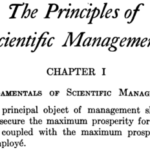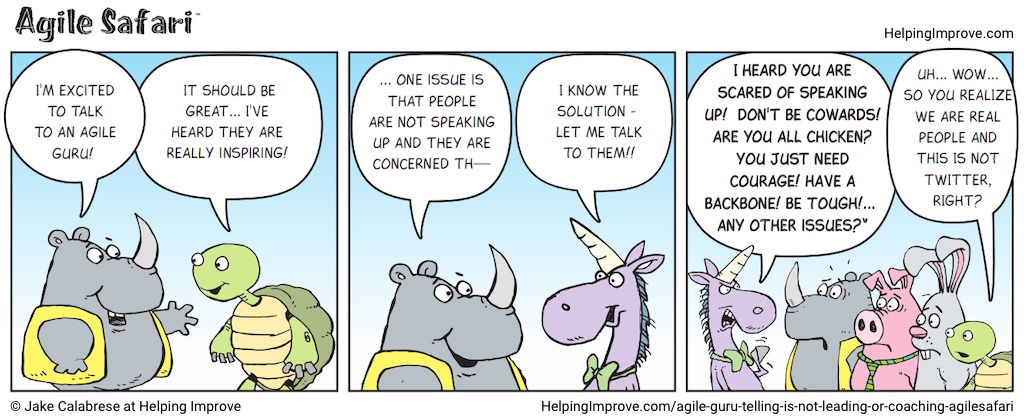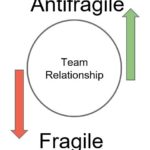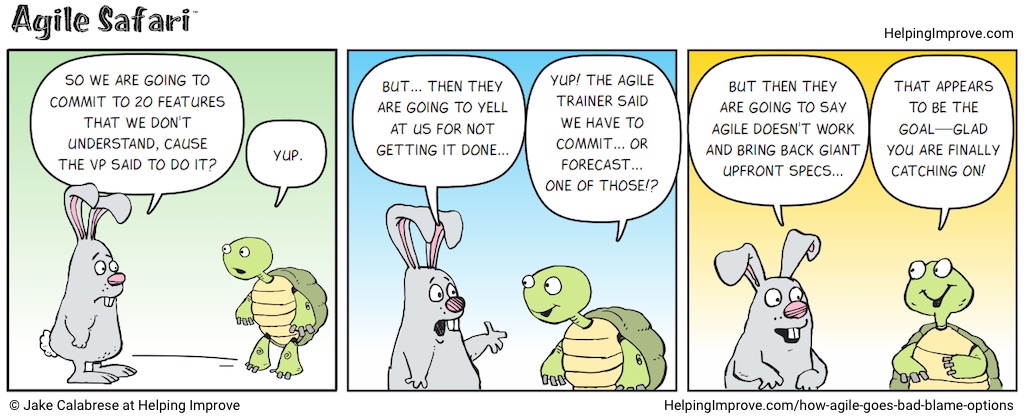Many people are working from home at this point and this will obviously continue for a while. Many organizations had already been working remote. I’ve worked on a number of remote teams and with a number of remote organizations well before the current situation we are in. I’ve done remote work as a coach, trainer, product manager, and team member well before the current situation we are in. Each of those instances I found myself enjoying some aspects of the work and also wishing for aspects to be in person. One of the most challenging things to do remotely is to listen.
Leadership
Agile Leadership Myth #3: Leaders & Managers will figure out what their agile role is magically
We have done a huge disservice to leaders and managers, as well as teams. There are plenty of people that will say we don’t need managers and leaders. People can lead themselves. While there is an aspect of this that may be true, there are a lot of steps to get close to that idea.
This article will explore what leaders and managers need to do to succeed as they get started with agile or to help teams move from individuals to a team or even a high-performance team. It builds on Agile Leadership Myth #2: Self-Organizing Teams Don’t Need Any Help.
Agile Leadership Myth #2: Self-Organizing Teams don’t need any help.
How did we arrive at this place where so many people believe that self-organizing teams do not need help? The fact is, self-organizing teams DO need help.

What teams can experience: Teams might not know exactly what kind of help they need or even how to describe it. This can be especially true if they had a manager-led team and were told what to do and when to do it. I hear teams say, “we don’t need managers”, but they often mean that they don’t need managers telling them what to do.
What managers can experience: Managers are often put in a position of shifting from being an expert and telling teams what to do to some new approach that is not clear to them. They may not know exactly how to help a self-organizing team. I call this clumsy management. It is not that they are doing it on purpose, they just happen to be bumping into things when trying to help. Managers are sometimes told to “stay out of the team’s way”, so they end up disengaged and not sure how to reengage. The fact that a manager may not be sure how to help a self-organizing team does not mean that help is not needed.
Agile Leadership Myth #1: Telling people “You Are Empowered” Actually Works
A major challenge we run into when helping organizations shift or improve is leadership misconceptions. Agile leadership myths cause a lot of these misconceptions. We need to help avoid falling into the trap of these common myths because they limit our success. A root cause of many of the myths is that people simply don’t know what else to do. For example, Myth #1: ‘telling people “you are empowered” actually works.’ Leaders often don’t know what else to do, other than tell teams they are empowered. We see this with Development Teams, Scrum Teams, Delivery Teams, AND Leadership Teams.
For example, Myth #1: ‘telling people “you are empowered” actually works.’ Leaders often don’t know what else to do, other than tell teams they are empowered. We see this with Development Teams, Scrum Teams, Delivery Teams, AND Leadership Teams.
A bit of background — there are many agile leadership myths out there. These myths (or assumptions) limit leaders ability to improve, help others, and succeed. Many myths seem to occur at a nonconscious level, meaning they function like many biases. People are not even aware, consciously, that they are happening.
Limit Engagement, Limit Success – Scientific Management Problems
We require environments where people can provide input and ideas. If we limit engagement, we limit success. We still have organizations who either believe or act like they believe some types of workers are “stupid.” This idea dates back to the ideas surrounding Scientific Management, Fredrick Taylor, and Henry Ford. The concept of the stupid or unskilled worker that I mentioned was common in the early 20th century. In various writings about agile and agile ideas, we often refer to or see references to avoiding Scientific Management, Classic Scientific Management, or Taylorism. These management ideas limit engagement from people, which is going to limit success.
Understanding the past can be quite helpful to see where you might be able to improve today.
Building Antifragile Relationships and Teams
I’ve presented a number of sessions on building antifragile relationships and teams. This post is a summary of the information from the sessions for anyone who attended (or anyone who is interested) as well links to related articles.
The Responsibility Process, Context, and Safety
The Responsibility Process™ is a practice (some may argue it’s more or less than a practice) that helps us move towards more self-mastery. Being able to facilitate ourselves is all about emotional intelligence – our ability to recognize and react appropriately in the moment to our emotions.
Is Your Training Amazing & Engaging? Or Does it Smell?
I find many things puzzling. One that is puzzling, frustrating, and annoying is how people continue to use outdated methods to train.












